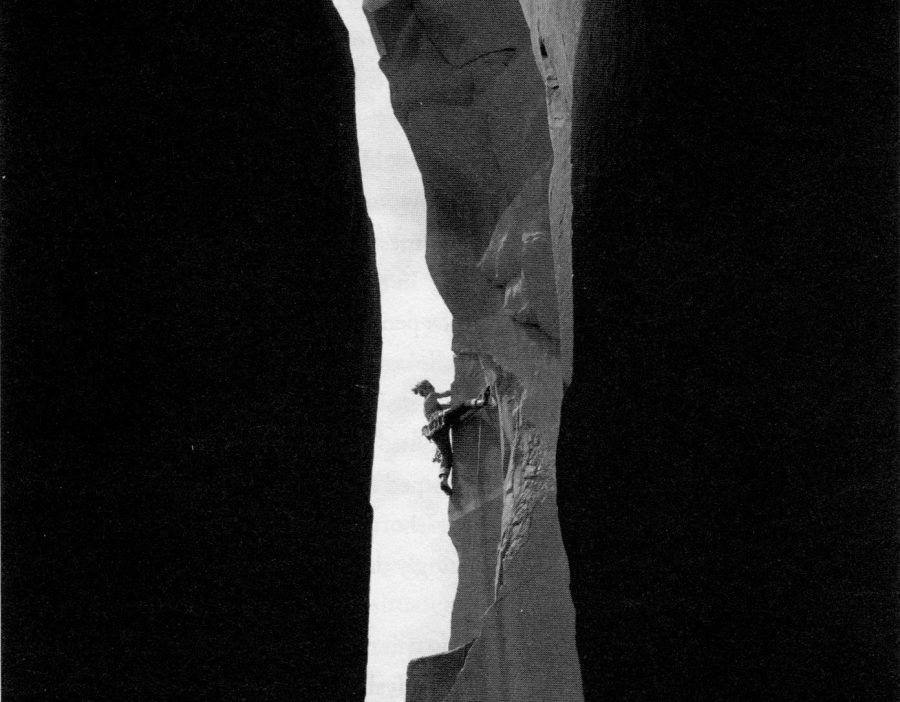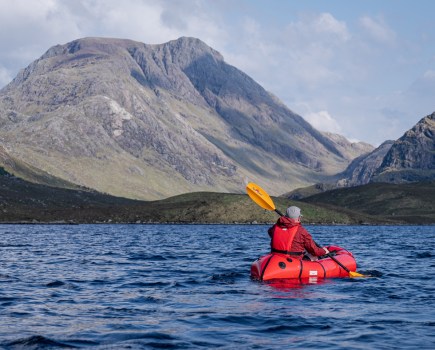There’s a lot in this large-format hardback book. Fifty-four individual short essays, covering hard rock climbing all over the world, mountaineering, lightweight backpacking, motorcycle trips, and even some expeditions on the open ocean by stand-up paddleboard. But put them all together, and Extreme Horizons becomes something even more: an account – or an attempt at an account – of adventure psychology and the meaning of mountaineering.
Main image: Canyon climber Kate Rutherford at Indian Creek, Utah | Credit: David Pickford
There’s one odd moment in the book in which he begins a chapter on climbing photography with – who else? – the poet Coleridge. So no, on that stormy August day in 1802 STC wasn’t carrying a Box Brownie. But David Pickford makes the case that the poet’s intensely visual verbal description is the precursor, as it were, of crag photography.
I mention this because it could also be a description of David Pickford’s own book. Pictures in words: the vivid, evocative descriptions of very difficult first ascents on obscure crags in countries the rest of us can’t even spell the names of. A wild camp in Patagonia: “Fast-moving strands of altostratus are making serpentine shapes in the monochrome air.” And I especially liked a lyrical account of crossing the tide-races between the Channel Islands on the paddleboard. “We’re gliding through aquamarine and turquoise water as the light refracts off the sandy bottom… A solitary puffin lands on the water just to starboard.”
But there are the philosophical bits in Extreme Horizons. These are highly praised on the back of the book by climbers and writers I have huge respect for: Helen Mort, Jim Perrin, Stephen Venables. I hesitate to disagree with them. But I do. Take this sentence, after he’s escaped an avalanche by skiing away just before it happens: “A rapid response to imminent risk is often key in these situations for a successful outcome to prevail.”

I’m afraid that, as a writer myself, a sentence like that fills me with quiet gloom. David Pickford is a very fine natural climber. But even so, he’s had to learn how to place a micro-wire behind a flake of rock. And the craft of writing, the same.
So, okay, I’m just a literary snob. Read this book for its vivid and beautiful accounts of climbs and deep-sea adventures. Admire, too, its pictures – not just pictures in the words, but actual photos, because this aspect of the book is cleverly done. Big double-page colour photos would dominate the text and turn this into a conventional coffee table book. But instead, we have black-and-white images, every five pages, printed on the same ordinary uncoated paper as the words. It takes a special sort of photo to work in that situation. These ones do.
And when it comes to the Meaning of Mountaineering: the better way to understand it is through the mountaineering itself. Which, over its 54 chapters, Extreme Horizons certainly does.
Extreme Horizons is published by Monograph Media (£29.95, hardback).
When contributors to The Great Outdoors aren’t out walking, some like to relax with a good book. Read their outdoor book reviews and discover your next adventurous bedtime story.







